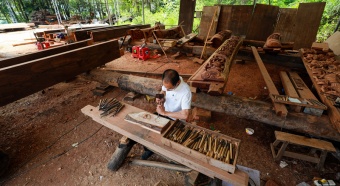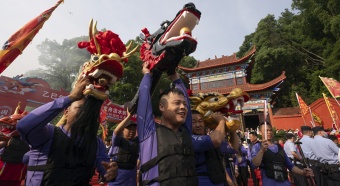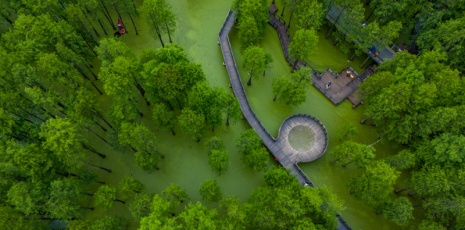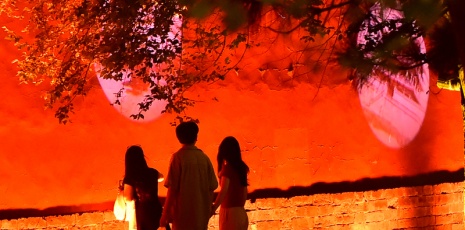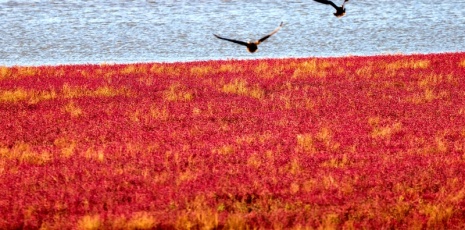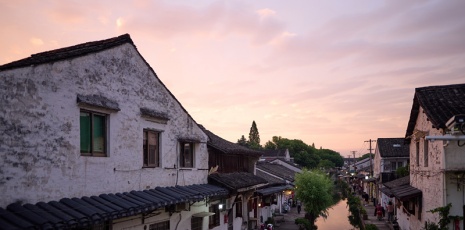In the late 1980s, I was born in a remote village in southern Jiangxi, which was 60 miles away from the town and surrounded by mountains, deep valleys, dense forests, trickling streams, and pieces of a verdant color.
In the 1990s, I spent an unforgettable childhood in the village dotted with mountains. I loved to spend a leisure time climbing a mountain, quietly gazing at the cooking smoke spinning on the roof, drifting over the pine forest and sending away the migratory birds that occasionally passed by, forming a delightful contrast with the old cattle that were tilling, resting, or grazing.
At that time, every household relied on cattle for farming, which has played an indispensable role in spring sowing and autumn harvesting, earning them the special treatment for “contributors”. During the busy days, the extra bowls of porridge and eggs were provided for them as rewards, except for the existing rice stalks, grass and rice bran. Definitely, raising cows was time-and energy-consuming, which was reflected by selection of suitable barn, spending of plenty of time, walk-out twice a day, frequent change of straw for cows’ comfort, and frequent cleaning of feces. The owner became distressed when the cow was sick, and a village veterinarian and a hearty meal were required, for fear of a mistake.
Grandparents recalled that at the beginning of the reform and opening-up policy of “assigning the land to individual households”, few people had cattle in their homes, and those who had one valued cattle as treasures. Before the busy season, villagers without cattle had to “borrow cattle” from relatives and neighbors who had one, on a certain day of a month. After the borrowers’ “earnest requests” and the owners’ “endless exhortations”, things were just half done. On the day of the contract, the cow rope could be handed over to the borrower only if the cow was in good condition and the owner's land had been ploughed. Before being returned, the borrowed cow had to be well-fed, and burdened with a load of rice for the owner as a reward.
In the 1990s when I was in elementary school, I was able to help my family do some farm works, and the cow rope fell into my hands naturally. Like my forefathers, I was on intimate terms with our farm cattle. I could accurately identify a cow by its physical characteristics from 100 meters away. Our cow was also easy to recognize: yellow-brown hair, long tail, short horns, warm eyes, and a black on its four feet and forehead, emitting kindness.
Pasturing cattle was a pleasure for me. Twice a day, I would pull the cow out of the field and find a fertile place for it. On weekends, we had to walk a little farther, together with some neighboring children, for three or four miles to find a semi-enclosed small valley, removing the cattle rope and allowing them to move freely. When the cattle were set free, so were our children. After enjoying the delightful half day by catching fish and shrimp under the river, robbing a bird’s nest on the tree, and rolling on the straw stacks, we found the round-bellied cattle and took them to the riverside for drinking, and climbed on the back of the cattle and set foot on the path home. It felt awesome riding a cow across the field and river, gently beating the cow on the back, and shouting “move on, move on” though in fact it was always slow and leisurely, satisfying all my imagination of “big horses” on TV.
In the blink of an eye, 20 years have passed so fast that it appears the time is unconsciously flowing. Whenever I returned to the old field, something has changed. The cattle are vanishing as time goes by, just like the plowshares, stone mills and wooden barrels. Unconsciously, the old memories are replaced by mechanical tillage machines, harvesters and pumping machines, resounding through the fields connected by the machine-farming roads, alleviating the hard work of the farmers.
Today, walking on the hometown roads, I feel many of my memories have changed. The old cow brought by an elder farmer walking toward me in the foggy and morning light is now replaced by a harvester working in the hustle and bustle among the fields. The old argument concerning dry farming or rice sowing among the family and the past irrigation of dying rice seedlings by wooden barrels are now replaced by the villagers’ long-cherished, advanced farmland infrastructure such as the powerful pump that can pump the river water hundreds of meters away. The villagers sweating on the fields among work songs are now dancing on the village square...
In the 40 years of reform and opening up, everything has been quietly changing. For me, the past entails unforgettable memories, the present richness, and the future, blueprints. The mere thing unchanged is the people’s hope and steady pace for a better future, as well as their growing senses of gain and happiness.
Now, the days of my homecoming are rare, compared with the days of my precise poverty alleviation activities at certain villages. No matter how time and space change, scenes of cooking smoke, fields and mountains are similar. Whenever I see the green grass along the ridge roads, memory of my childhood with old cows dawns on me. I really want to hold that mud-smelled nylon rope in my hands, carrying a strong old cow beating mosquitoes and flies on its back with its tail and crunching the grass with complacency.

